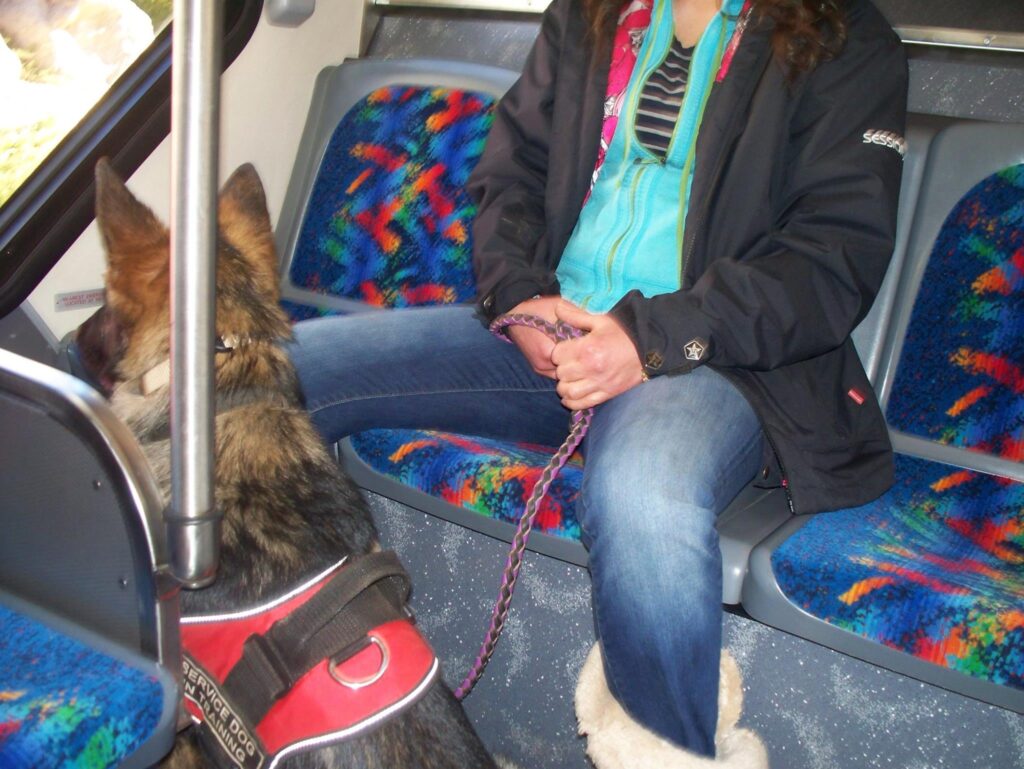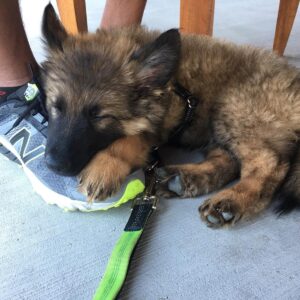
https://www.youtube.com/watch?v=yXqNl5bTCMU
Well, that is a story that began a few decades ago. I had a lower-energy family companion, German Shepherd, as a child. A dog who was intuitively intelligent, calm, and loved everyone. He was never aggressive towards anyone who entered our home-until the night he made a different decision.
One hot summer night, my father was watching T.V. in the living room while my mother was tucking us kids, into bed. Suddenly we heard a loud commotion in the living room. My mother handed me the dog by the collar and told us to stay in the room. Shortly after she left us, we heard her screaming. I quickly opened the door and let Yogi out, honestly expecting nothing from our family pet but holding tight to a child’s belief that our loyal friend would save us from the source of the terrifying sounds coming from the living room. Only moments after Yogi shot down the hallway, we heard the intruder screaming.
A large man high on drugs had busted through our screen door and begun to beat my dad with one of our heavy oak dining room chairs. When my mother came out, he turned on her but could not hit her before Yogi lunged through the air at him. Yogi proceeded to attack the man while he ran through a glass door and down our driveway. Yogi ended the attack at the end of the driveway. He returned to sit beside my father, lying on the living room floor. My father suffered a cracked skull, broken ribs, and a punctured lung during the attack. My mother was unharmed–saved by Yogi’s timely entrance. When the paramedics entered the house and began to help my father, Yogi never aggressively moved toward them. He sat quietly by my father until the paramedics took him to the hospital. My father spent six weeks in the hospital but survived because of the intuitive intelligence, problem-solving abilities, and love of a wonderful dog breed.
The story explains why we have become so very specific about the dogs we train and breed. I began breeding German Shepherds in my late teens and twenties. When I became a mother, I decided to let my line end and focus on my family. Later in life, I decided to buy a German Shepherd for my family. I was shocked when I had to reject dogs for being too aggressive, high energy/drive, or just plain neurotic. These were not the dogs I grew up with…so I began researching. I learned that many German Shepherd Dogs are now bred for sport rather than for family life. I have nothing against sport or dogs bred for police work, but they do not always make the best family companions. Selective breeding for traits such as aggression (sport) and high activity levels (sport) significantly increases the risk of behavior problems that an average family cannot handle. Family companion traits can be overlooked when a dog is bred strictly to produce puppies that will title in sport or conformation. I believe that the naturally protective German Shepard Dog should also be available to families–not only for show and work.
Steve Zawistowski, Ph.D., CAAB, mentioned during a lecture he gave at the 2015 Society For The Promotion Of Applied Research In Canine Science (SPARCS): If we want to keep dogs out of shelters, some breeders could do a better job of breeding for companion dog traits in our working dogs.
Families want specific breeds because of the traits they are known for. They do not wish the over-the-top working characteristics that are being focused on for the show ring. A percentage of breeders should focus on working traits, but not all. At Tre’Good our main focuses are family companion and service dog traits and intelligence.
An intelligent German Shepherd with a balanced temperament will protect his family if needed. I would not own a German Shepherd trained to attack humans when we had children and teenagers running in and out of our house. I do not recommend a dog trained to attack humans for families. Experienced handlers should only own these dogs. We have a large extended family; we have toddlers and children running around during family gatherings. A stuffed animal or a blankie in a child’s arms can look very much like the sleeve attack dogs are trained on. All dogs think for themselves and are never 100% under our control.
Serious injuries have occurred with dogs trained to attack. Training a dog to bite a person is a game-changer. We will only live with and breed dogs that can sense the difference between someone we accept and someone who may harm us. We should not have to tell them the difference.
 The German Shepherd puppies we choose for our training program must possess intense intelligence and problem-solving abilities coupled with a strong desire to bond with and please their handler. Our prospective German Shepherds must be mentally balanced. It is important to understand that the Schutzhund titles of a parent do not guarantee a mentally stable or healthy puppy. We learned this fact the hard way, but more information is now becoming available. Please watch the documentary:
The German Shepherd puppies we choose for our training program must possess intense intelligence and problem-solving abilities coupled with a strong desire to bond with and please their handler. Our prospective German Shepherds must be mentally balanced. It is important to understand that the Schutzhund titles of a parent do not guarantee a mentally stable or healthy puppy. We learned this fact the hard way, but more information is now becoming available. Please watch the documentary:
http://documentaryheaven.com/bbc-pedigree-dogs-exposed/mentary Pedigree Dogs Exposed. And also watch, Pedigree Dogs Exposed; Three years on.
Our training methods are designed to enhance the natural, healthy mental outlook of a well-bred German Shepherd. Fear of physical pain is not used to compel the desired training results quickly. The relationship we create with our dogs warrants a powerful loyalty to their handlers. Our methods may take longer, but our dogs know that learning is fun and safe. They understand that the effort they put in trying to solve the problems we present to them will be rewarded. Our training methods utilize positive reinforcement, brain games, play, differing routines, and other proprietary techniques. We also regularly change training locations and vary our dogs’ experiences to prove our training in the real world. Our education strategy also eliminates aversion caused by boredom and repetition. We challenge our dogs to stay in a problem-solving state of mind by continually changing our routines. Instead of using step-by-step, repetitive, mind-numbing training programs, we teach our dogs how to learn. You might compare our training to problem-based learning used in progressive schools around the country. We combine these unique training methods with play, fun, adventure, and love to enhance what we call the “learning drive” in our puppies. Our dogs’ pure joy in their work or their “learning drive” is what makes a Tre’Good German Shepherd and all of our Trained German Shepherds, no matter their age, exceptional friends and companions.
techniques. We also regularly change training locations and vary our dogs’ experiences to prove our training in the real world. Our education strategy also eliminates aversion caused by boredom and repetition. We challenge our dogs to stay in a problem-solving state of mind by continually changing our routines. Instead of using step-by-step, repetitive, mind-numbing training programs, we teach our dogs how to learn. You might compare our training to problem-based learning used in progressive schools around the country. We combine these unique training methods with play, fun, adventure, and love to enhance what we call the “learning drive” in our puppies. Our dogs’ pure joy in their work or their “learning drive” is what makes a Tre’Good German Shepherd and all of our Trained German Shepherds, no matter their age, exceptional friends and companions.
German Shepherds working in the Step Above Family Companion and German Shepherd Service Dog Programs enjoy various socialization opportunities. All of our puppies undergo basic socialization, but Service and Step Above dogs have hundreds of hours added to the basic program. The older trained pups move further into the world for a rich and deep experience of all things human.
A well-behaved dog in daily life and public situations is allowed many opportunities for environmental enrichment. They are easy to be within all circumstances, which enables the dog to live a full life and fulfills their deepest desire to be with their handler as often as possible. We put tremendous effort into our training program so you can know the joys of dog ownership but also so your dog can have the life s/he deserves.